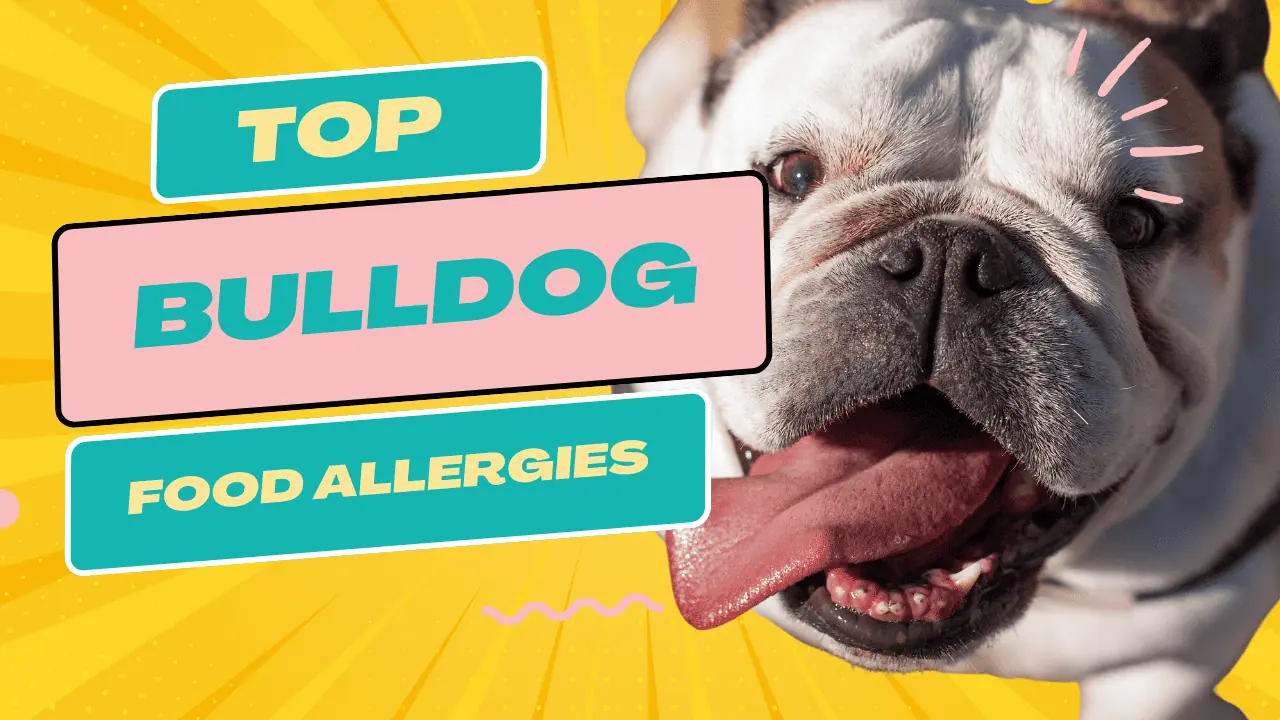Bulldogs are known for their wrinkly faces, stocky build, and loving temperament. But as much as we adore our furry friends, they are prone to food allergies, and that can be dangerous. Food allergies in bulldogs can cause a range of symptoms from mild to severe, including itching, vomiting, diarrhea, and even anaphylaxis.
In this blog post, we’ll take an in-depth look at four common food allergens in bulldogs: chicken, wheat gluten, soy, and dairy. We’ll discuss the symptoms of food allergies and their dangers. Then, we’ll offer some home remedies for bulldog food allergies and provide guidance on what to do if you suspect your bulldog has a food allergy.
What is a food allergy? An allergy happens when a dog’s immune system overreacts to a particular ingredient in their food. Unlike humans, there are no tests for food allergies in dogs. The most common symptoms of a food allergy are; Itchy skin, irritated paws, loss of fur in patches, rashes, hives, hot spots, infection on the skin or in the ears, lethargy, overall unpleasant odor, GI issues such as diarrhea or vomiting.
Common Food Allergens in Bulldogs
Bulldogs can develop allergies to a variety of foods, but some are more common than others. Here are four common food allergens in bulldogs:
Chicken: Chicken is a common ingredient in commercial dog food. Unfortunately, it’s also the most common allergen in bulldogs. Chicken allergies in bulldogs are typically caused by the protein in chicken meat or eggs. If your bulldog is allergic to chicken, it’s essential to avoid all foods that contain chicken, including chicken meal, chicken fat, eggs and chicken by-product meal.
Wheat gluten: Wheat gluten is a protein found in wheat and other grains. Many commercial dog foods contain wheat gluten because it’s an inexpensive source of protein. However, wheat gluten is a common allergen in bulldogs and can cause a range of symptoms.
Soy: Soy is another inexpensive source of protein used in many commercial dog foods. However, soy is also a common allergen in bulldogs, and it can cause a range of symptoms, including skin irritation, digestive issues, and respiratory problems.
Dairy: Dairy products, such as milk and cheese, can also be a problem for bulldogs. Many bulldogs are lactose intolerant, which means they have trouble digesting lactose, a sugar found in milk. This can cause digestive issues, including diarrhea and vomiting.

Symptoms of Bulldog Food allergies
The symptoms of food allergies in bulldogs can vary from mild to severe. Here are some common symptoms to watch out for:
Skin irritation: Bulldogs with food allergies often develop skin irritation, such as itching, redness, and rashes. They may also develop hives or welts.
Digestive issues: Bulldogs with food allergies may also experience digestive issues, such as vomiting, diarrhea, and flatulence.
Respiratory problems: In some cases, bulldogs with food allergies may develop respiratory problems, such as coughing, wheezing, and difficulty breathing.
Ear infections: Food allergies in bulldogs can also cause ear infections. Bulldogs with food allergies may scratch at their ears or shake their heads frequently.
Anaphylaxis: In severe cases, bulldogs with food allergies can develop anaphylaxis, a life-threatening allergic reaction. Symptoms of anaphylaxis include difficulty breathing, swelling of the face and neck, and collapse.
Dangers of Bulldog Food Allergies
Food allergies in bulldogs can be dangerous, especially if left untreated. If your bulldog is allergic to a certain food and continues to eat it, the symptoms can become more severe over time. Here are some potential dangers of bulldog food allergies:
Malnutrition: If your bulldog is allergic to a specific food and you don’t change their diet, they may not be getting the nutrients they need to stay healthy. This can lead to malnutrition and a weakened immune system.
Infections: Bulldogs with food allergies may be more susceptible to infections. For example, if your bulld
Food allergies in bulldogs can be dangerous, especially if left untreated. If your bulldog is allergic to a certain food and continues to eat it, the symptoms can become more severe over time. Here are some potential dangers of bulldog food allergies:
Malnutrition: If your bulldog is allergic to a specific food and you don’t change their diet, they may not be getting the nutrients they need to stay healthy. This can lead to malnutrition and a weakened immune system.
Infections: Bulldogs with food allergies may be more susceptible to infections. For example, if your bulldog has skin irritation from a food allergy and scratches at the affected area, they may develop a bacterial infection.
Chronic inflammation: Food allergies in bulldogs can cause chronic inflammation throughout their body. Chronic inflammation can lead to a range of health issues, including joint pain, digestive problems, and autoimmune disorders.
Anaphylaxis: As mentioned earlier, severe cases of food allergies in bulldogs can lead to anaphylaxis. Anaphylaxis can be fatal if not treated immediately.
MUST READ: https://bulldogmama.com/bulldog-nutrition-what-every-owner-should-know/
Alternative Foods for Bulldogs with Allergies
If your bulldog has a chicken or poultry allergy, there are plenty of alternative food options available that are just as healthy and nutritious. Here are some alternative protein sources you can try:
Fish: Fish is an excellent source of omega-3 fatty acids, which help improve skin and coat health. Look for dog food that contains fish as the primary source of protein, such as salmon or trout. These options are often grain-free and can help provide a balanced diet for your bulldog.
Lamb: Lamb is a popular alternative protein source for dogs with allergies, and it’s rich in essential amino acids.
Venison: Venison is a lean protein source that’s easy to digest and rich in B vitamins.
Hypoallergenic dog food: Hypoallergenic dog food is specially formulated for dogs with food allergies and is made with limited ingredients to minimize the risk of triggering an allergic reaction.
Limited ingredient diets: These types of diets contain a smaller number of ingredients, which can help eliminate the potential allergens that may be causing your bulldog’s reactions. Look for limited ingredient dog foods that are specifically formulated for food allergies.
Homemade diets: If you prefer to have complete control over your bulldog’s diet, you can consider making their food at home. However, it’s important to consult with a veterinarian or canine nutritionist to ensure that the diet is nutritionally balanced.
MUST READ: https://bulldogpapa.com/can-french-bulldogs-eat-blueberries/#more-3137
What to do if your dog has a food allergy?
Before anything else, you should see your vet and have your dog examined. Food allergy symptoms can look like other conditions so it’s important for a vet to confirm. Your vet may recommend a hypoallergenic diet or allergy testing. However, there are also some home remedies you can try to alleviate your bulldog’s symptoms:
Coconut oil: Coconut oil is a natural anti-inflammatory that can help reduce skin irritation in bulldogs with food allergies. You can apply coconut oil topically to affected areas or add it to your bulldog’s food.
Apple cider vinegar: Apple cider vinegar has antimicrobial properties that can help treat bacterial infections in bulldogs with food allergies. You can mix a small amount of apple cider vinegar with water and apply it to affected areas.
Probiotics: Probiotics can help improve digestion and boost the immune system in bulldogs with food allergies. You can add probiotics to your bulldog’s food or give them a probiotic supplement.
Omega-3 fatty acids: Omega-3 fatty acids can help reduce inflammation in bulldogs with food allergies. You can add omega-3 supplements to your bulldog’s food or give them fish oil.
Food allergies in bulldogs can cause a range of health issues and can be challenging to diagnose. If you suspect that your bulldog has a food allergy, consult your veterinarian, who can help determine the allergen and provide guidance on appropriate food options. By avoiding chicken based dog food and switching to alternative protein sources, you can help keep your furry friend healthy and happy. Always check the ingredient list of your dog food and treats to ensure that they are chicken-free.
If you are in a dog “barkery” or specialty shop, don’t be afraid to ask for the full ingredients list for their treats. You’d be surprised how many use chicken. Just because it’s homemade and “all natural” doesn’t mean that it doesn’t have chicken in it. Don’t be afraid to ask!

